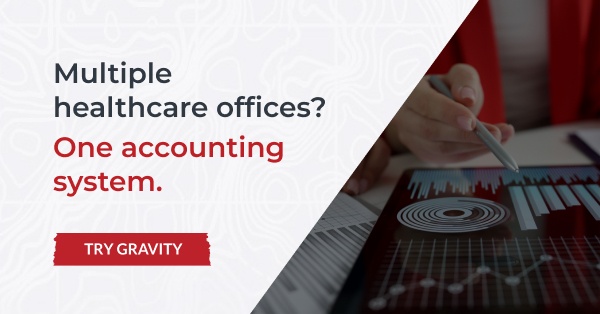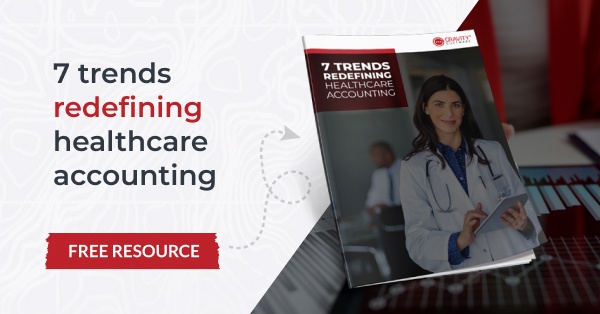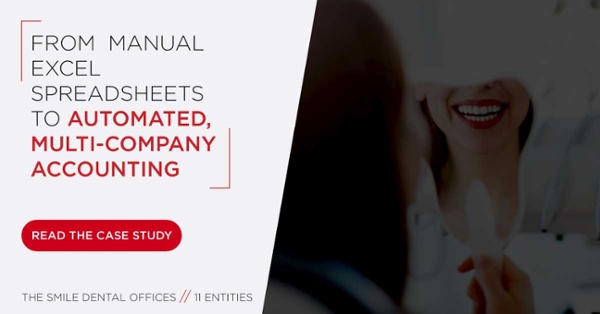Maximize healthcare accounting efficiency with 3 key strategies

Healthcare providers are still feeling financial strain from the COVID-19 pandemic, with an estimated $200 billion, in losses according to the American Hospital Association.
As many patients delayed or postponed care, healthcare systems faced significant disruptions. To aid in recovery, it’s crucial to streamline accounting practices for improved financial visibility and efficiency across all locations.
If your healthcare organization struggles with month-end financial reporting or lacks a clear view of your finances, these three strategies will help you optimize healthcare accounting processes, saving you time and improving decision-making.
1. Accrual method: Why it's the best fit for healthcare accounting
The accrual method of accounting is essential for healthcare organizations as it helps provide a more accurate picture of financial health. Unlike cash-based accounting, which only records transactions when cash is exchanged, the accrual method records revenue and expenses when they are incurred, regardless of cash flow.
For healthcare systems that deal with multiple payers—such as private insurance companies, Medicare, Medicaid, or patient payment plans—the accrual method provides a clearer view of revenue, even when payments are delayed. This method ensures that your organization tracks revenue and expenses in real time, offering better financial forecasting and allowing for more strategic planning.
2. Implement a multi-entity healthcare accounting solution
Healthcare systems often operate across multiple entities or locations, each with its own set of financial challenges. By implementing a multi-entity healthcare accounting software solution, you can simplify financial management across your entire organization and eliminate redundant processes.
With an integrated system, all your financial data is consolidated in real-time, saving time and reducing manual data entry errors. This consolidation allows you to generate comprehensive financial reports, balance sheets, and income statements with just a few clicks.
Key benefits include:
- Real-time consolidated reporting: View company-wide balance sheets and income statements in a single, consolidated report, accessible at a glance.
- Personalized dashboards: Tailor your reporting to meet the needs of specific stakeholders, enabling easy comparisons between locations and identifying underperforming areas.
- Informed decision-making: Make better business decisions, such as consolidating locations or reallocating resources, based on accurate financial performance data.
A multi-entity system also integrates with your EMR and billing systems, making it easier for your accounting team to track financial data across all locations with minimal manual input.
3. Automate manual accounting processes
Relying on manual accounting processes not only wastes time but can also lead to errors that compromise financial accuracy. According to the institute of Entrepreneurship Development (iED), manual processes can reduce employee satisfaction and slow down overall efficiency.
The good news is that automation in healthcare accounting can significantly reduce the manual workload. By automating workflows for invoice management, expense tracking, and financial reporting, your organization can improve efficiency and accuracy.
Here’s how automation can help:
- Automated invoice management: Send and track invoices without the need for manual data entry.
- Expense tracking: Automate the approval process for expenses, improving accuracy and reducing approval delays.
- Financial reporting: automatically generate monthly and quarterly financial reports, ensuring consistency and reducing manual reporting errors.
Automating these routine accounting tasks frees up your staff to focus on more complex financial challenges and strategic initiatives, reducing the chance of burnout while improving overall performance.
Testimonial: Dr. Tavel family eye care
"With all the time we’re saving on bank reconciliation, month-end close, and other routine tasks, we can focus on more financial analysis, budgeting, and providing valuable feedback to the company on strategic direction."
– Tera Carpenter, VP of Finance and HR, Dr. Tavel Family Eye Care
Dr. Tavel Family Eye Care faced significant challenges with an outdated accounting system, causing inefficiencies and delays in month-end close. After implementing Gravity Software, they reduced their month-end close time from over 30 days to just 10-15 days, dramatically improving efficiency. Tasks that once took days, such as triple-net lease calculations, now take just a few hours, freeing up the team to focus on higher-level financial analysis and strategic decision-making.
To read more about how Dr. Tavel Family Eye Care transformed their accounting operations, check out the full customer story here.
Streamline your healthcare accounting with Gravity
Managing accounting for multiple healthcare practices can be time-consuming, especially if your organization is still relying on manual processes to consolidate financial data. Gravity Software is built specifically to streamline multi-entity accounting for healthcare systems.
Gravity allows you to:
- Consolidate financial data across all locations in real time.
- Automate time-consuming manual processes like invoicing and expense tracking.
- Generate real-time reports for individual locations or company-wide financial health at the click of a button.
- Integrate with your existing EMR, EHR, and billing systems seamlessly, reducing manual entry and improving accuracy.
- Ensure HIPAA compliance and maintain data security, thanks to Gravity’s secure platform built on Microsoft Power Platform.
With Gravity’s user-defined dashboards, you can ensure that relevant financial data is accessible to stakeholders at all levels, from front-line staff to executive decision-makers. Whether you need to monitor day-to-day operations or evaluate high-level financial performance, Gravity’s intuitive and secure platform allows you to keep your organization running smoothly.
Ready to improve your healthcare accounting efficiency?
If you’re ready to streamline your accounting processes, improve accuracy, and automate time-consuming tasks, Gravity Software can help. Schedule an online demo today to see how Gravity can transform your healthcare accounting and support your path to financial recovery.
Gravity Software
Better. Smarter. Accounting.




